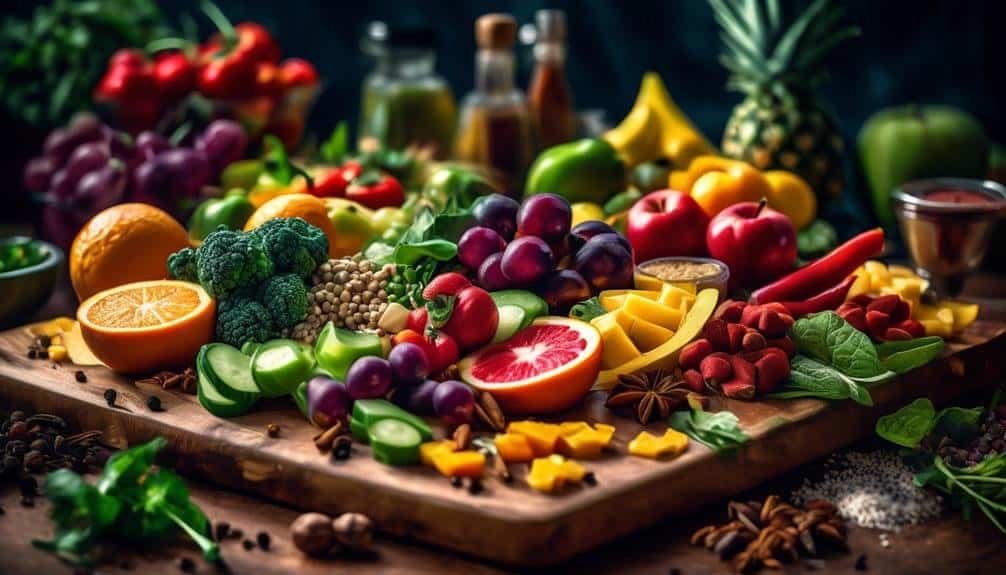Cooking and Nutrition for Special Diets
Cooking and nutrition play a crucial role in managing special diets, whether it's due to allergies, intolerances, or specific health conditions. The intersection of culinary expertise and nutritional knowledge becomes even more critical when catering to these dietary needs.
From understanding the essential nutrients and key ingredients to avoid or substitute, to mastering meal planning and cooking techniques, there's a wealth of information to explore in the realm of special diets.
Whether you're looking to create flavorful recipes for gluten-free diets, nourishing meals for dairy-free diets, or exploring delicious options for vegan and plant-based diets, there's a world of culinary possibilities waiting to be uncovered.
Key Takeaways
- Understanding the importance of nutritional requirements for special diets
- Consulting with a registered dietitian or nutritionist for personalized guidance
- Prioritizing nutrient-dense foods and incorporating a variety of nutrient-rich options
- Identifying suitable replacements for specific dietary restrictions to maintain flavor and texture in recipes
Understanding Special Dietary Needs
Understanding and addressing the nutritional requirements of individuals with special dietary needs is crucial for their overall health and well-being. Allergen awareness and food sensitivities play a significant role in determining suitable dietary choices for such individuals. It is essential to identify and eliminate allergens or foods that trigger sensitivities to prevent adverse reactions.
Furthermore, digestive health and the gut microbiome are vital considerations. A balanced diet that supports the growth of beneficial gut bacteria can aid in digestion and nutrient absorption, thereby promoting overall health.
Adhering to specific dietary restrictions requires careful meal planning and ingredient selection. Nutrient-dense foods that cater to individual dietary needs should be prioritized to ensure the intake of essential vitamins and minerals. Additionally, consulting with a registered dietitian or nutritionist can provide valuable guidance in creating well-rounded meal plans.
Essential Nutrients for Special Diets
As individuals with special dietary needs require specific nutrients to support their health, it is essential to understand the key nutrients necessary for these diets.
Meeting dietary needs through nutrient-rich food choices is a crucial aspect of maintaining overall health and well-being.
Therefore, a discussion of essential nutrients for special diets will provide valuable insights into the nutritional requirements of individuals with unique dietary needs.
Key Nutrients for Diets
Key nutrients play a crucial role in supporting the specific dietary needs of individuals with special diets, ensuring that they receive the essential elements necessary for optimal health and well-being.
Protein sources are particularly important for individuals with special diets, such as those following a vegetarian or vegan diet, as they need to ensure they are obtaining an adequate amount of protein from plant-based sources.
Additionally, individuals with special diets may be at a higher risk of certain vitamin deficiencies due to the restricted nature of their diets. Therefore, it is essential to pay close attention to potential deficiencies in key vitamins such as B12, D, and iron.
Incorporating a variety of nutrient-dense foods and, when necessary, supplementation can help mitigate the risk of these deficiencies and support overall health for individuals with special dietary needs.
Meeting Dietary Needs
Individuals with special dietary needs must ensure they obtain essential nutrients from a diverse range of foods to support their overall health and well-being. Meeting dietary needs for special diets involves personalized approaches such as customized meal plans, which cater to specific nutritional requirements.
Additionally, dietary supplements play a crucial role in addressing any deficiencies that may arise due to dietary restrictions. These supplements are carefully selected to complement the individual's diet, providing essential vitamins, minerals, and other nutrients that may be lacking.
It is essential for individuals with special dietary needs to work closely with registered dietitians or healthcare professionals to develop a comprehensive plan that ensures all necessary nutrients are obtained to maintain optimal health.
Nutrient-Rich Food Choices
Selecting nutrient-rich foods that align with specific dietary needs is essential for maintaining optimal health and well-being in individuals with special diets.
Superfood options like quinoa, chia seeds, and kale are excellent choices due to their high nutrient density. These foods are packed with essential vitamins, minerals, and antioxidants, making them valuable additions to special diets.
Nutrient-dense snacks such as Greek yogurt with berries, mixed nuts, and edamame provide a convenient way to boost nutrient intake without compromising dietary restrictions.
When it comes to quick meal ideas, incorporating lean proteins like grilled fish or tofu, along with a variety of colorful vegetables, can create balanced and satisfying meals. Healthy cooking techniques such as steaming, grilling, and roasting help preserve the nutritional value of the ingredients, making them ideal for special diets.
Key Ingredients to Avoid and Substitute
When following a special diet, it is essential to carefully identify and replace ingredients that may be harmful or not suitable for dietary restrictions. Here are some key ingredients to avoid and their suitable substitutes:
- Gluten: For those with gluten intolerance or celiac disease, wheat flour can be replaced with almond flour, coconut flour, or gluten-free oat flour in baking and cooking.
- Dairy: Individuals with lactose intolerance or dairy allergies can opt for dairy-free alternatives such as almond milk, coconut milk, or soy milk. Nutritional yeast can also be used as a cheese substitute in various dishes.
- Eggs: When baking or preparing meals, eggs can be replaced with ingredients like mashed bananas, applesauce, or flaxseed meal mixed with water. These alternatives work well as binding agents and provide moisture in recipes without the use of eggs.
Meal Planning for Special Diets
In meal planning for special diets, it is essential to consider dietary restrictions. This involves identifying any specific foods or ingredients that should be avoided or limited due to allergies, intolerances, or medical conditions. By understanding these restrictions, individuals can make informed decisions about what foods to include or exclude from their meal plans.
Another important aspect of meal planning for special diets is modifying recipes to accommodate specific needs. This may involve substituting certain ingredients or adjusting cooking methods to create dishes that meet dietary requirements. For example, someone following a gluten-free diet may need to use alternative flours or binders in baking recipes, while someone with a dairy allergy may need to use non-dairy milk or cheese substitutes.
Incorporating nutrient-rich ingredient swaps is also crucial in meal planning for special diets. This involves choosing alternative ingredients that provide similar nutritional benefits to those being avoided. For instance, replacing high-sodium processed foods with fresh herbs and spices can add flavor to a dish without compromising dietary restrictions. Similarly, using plant-based protein sources like beans or tofu can be a suitable alternative for individuals following a vegetarian or vegan diet.
These points will guide individuals in creating balanced and satisfying meals while adhering to their dietary requirements. By considering dietary restrictions, modifying recipes, and incorporating nutrient-rich ingredient swaps, individuals can effectively plan and prepare meals that align with their nutritional needs and personal dietary restrictions.
Dietary Restrictions Considerations
Considering dietary restrictions is essential when planning meals for special diets. It is important to ensure that meals are not only safe but also delicious and satisfying. Here are some key considerations to keep in mind:
- Allergen-Free Options and Ingredient Substitutions: Identify common allergens such as gluten, dairy, nuts, and soy, and explore alternative ingredients to accommodate these restrictions. For instance, using almond milk as a dairy substitute or gluten-free flour instead of wheat flour.
- Flavor Enhancement and Seasoning Alternatives: Experiment with herbs, spices, and natural flavorings to enhance the taste of dishes without relying on common allergens. For example, using herbs like rosemary and thyme to add depth of flavor, or utilizing citrus juices for a tangy twist.
- Texture and Consistency Modifications: Adjust recipes to achieve the desired texture and consistency, especially when common allergens or restricted ingredients are omitted. For instance, using mashed bananas as a binding agent in place of eggs or incorporating alternative flours for baking.
Recipe Modification Tips
Adapting recipes to accommodate special diets requires thoughtful consideration of ingredient substitutions and cooking techniques to ensure both nutritional adequacy and culinary enjoyment.
When making ingredient substitutions, it's crucial to maintain the nutritional value of the original ingredient. For example, using applesauce as a fat substitute in baking can reduce the calorie and fat content while maintaining moisture.
Recipe adjustments, such as reducing sodium or sugar, should be done gradually to allow for taste adjustment. Additionally, flavor enhancement and taste balance are essential to ensure that modified recipes are still enjoyable. Incorporating herbs, spices, and citrus juices can add depth to dishes without relying on excessive salt or sugar.
Ultimately, recipe modification for special diets is a balance between meeting nutritional needs and creating delicious, satisfying meals.
Nutrient-Rich Ingredient Swaps
To continue our exploration of accommodating special diets through recipe modification, the focus now shifts to the strategic utilization of nutrient-rich ingredient swaps in meal planning.
Nutrient-Rich Ingredient Swaps
- Whole Grains: Replace refined grains with whole grains like quinoa, brown rice, or whole wheat flour to increase fiber and essential nutrients.
- Healthy Fats: Substitute saturated fats with healthier options such as avocado, olive oil, or nuts to promote heart health.
- Plant-Based Proteins: Swap animal proteins with plant-based alternatives like lentils, chickpeas, or tofu to reduce saturated fat intake and increase fiber and phytonutrient consumption.
Incorporating these ingredient alternatives can effectively support dietary modifications by enhancing the nutritional quality of meals without compromising flavor or satiety.
Cooking Techniques and Tools for Special Diets
When preparing meals for special diets, it is essential to employ specialized cooking techniques and tools to ensure nutritional adequacy and palatability. Special diets often require innovative recipes that cater to specific dietary needs, such as gluten-free, low sodium, or dairy-free.
To meet these requirements, various cooking methods and specialized ingredients can be utilized. For example, steaming, grilling, and roasting are cooking methods that help retain the natural flavors and nutrients in ingredients, making them suitable for special diets. Specialized tools such as spiralizers for creating vegetable noodles, food processors for making nut-based sauces, and air fryers for reducing oil consumption can enhance the variety and appeal of special diet meals.
Additionally, specialized ingredients like almond flour, coconut aminos, and nutritional yeast can be used to replace traditional ingredients in recipes, ensuring that the meals remain flavorful and nutritionally sound. These ingredients cater to dietary restrictions while allowing for the creation of diverse and satisfying dishes.
Flavorful Recipes for Gluten-Free Diets
Building upon the utilization of specialized cooking techniques and tools for special diets, the focus now shifts to exploring flavorful recipes tailored specifically for gluten-free diets. Adhering to a gluten-free diet doesn't mean sacrificing taste. With the right ingredients and methods, it's possible to create delicious and satisfying dishes that cater to gluten-free requirements. Here are some flavorful recipes for gluten-free diets:
- Decadent Flourless Chocolate Cake: Indulge in a rich and moist chocolate cake that's free from gluten. This dessert is perfect for special occasions or as a delightful treat.
- Quinoa Salad with Roasted Vegetables: This colorful and nutritious salad combines the nutty flavor of quinoa with the sweetness of roasted vegetables, providing a satisfying and gluten-free dish.
- Gluten-Free Banana Bread: Enjoy a classic and comforting slice of banana bread without worrying about gluten. This recipe uses alternative gluten-free flours to achieve a moist and flavorful loaf.
When it comes to gluten-free baking, it's essential to use gluten-free flour blends, such as almond flour, coconut flour, or rice flour, to achieve the desired texture and taste in baked goods.
Nourishing Meals for Dairy-Free Diets
Exploring nourishing and satisfying meal options tailored for dairy-free diets is essential for individuals seeking to maintain a well-balanced and nutritious eating plan while avoiding dairy products. When eliminating dairy from the diet, it's crucial to find suitable alternatives to ensure an adequate intake of essential nutrients such as calcium.
Fortunately, there are various dairy alternatives and calcium sources available. For instance, fortified plant-based milk like almond, soy, or oat milk can be excellent substitutes for dairy milk. Additionally, dark leafy greens, tofu, almonds, and chia seeds are rich in calcium and can be incorporated into dairy-free meals to meet the body's calcium needs.
Furthermore, for those following a dairy-free diet, it's important to have nourishing snacks and dessert options that are both satisfying and rich in essential nutrients. Snacks such as mixed nuts, fresh fruit with dairy-free yogurt, or homemade granola bars can provide energy and essential nutrients.
When it comes to dessert, fruit sorbets, dairy-free dark chocolate, and chia seed pudding are delicious options that cater to a dairy-free diet while offering a satisfying sweet treat.
Delicious Options for Vegan and Plant-Based Diets
To continue our exploration of specialized dietary options, we now turn our focus to the delectable array of meal choices available for individuals adhering to vegan and plant-based diets.
For those seeking to satisfy their sweet tooth, there is an abundance of vegan dessert options that are both delicious and nutritious. Some popular choices include dairy-free chocolate avocado mousse, coconut milk ice cream, and vegan banana bread made with whole wheat flour and natural sweeteners.
When it comes to obtaining adequate protein on a plant-based diet, there are numerous nutrient-dense options to choose from. Some excellent sources of plant-based protein include tofu, tempeh, lentils, chickpeas, quinoa, and edamame. These ingredients can be used to prepare a variety of satisfying and flavorful dishes, such as tofu stir-fry, lentil curry, and quinoa salad.
In addition to these protein sources, nuts and seeds are also valuable additions to a vegan or plant-based diet. Incorporating almonds, chia seeds, hemp seeds, and pumpkin seeds into meals and snacks can provide essential nutrients, including protein, healthy fats, and fiber.
Conclusion
In conclusion, catering to special dietary needs requires a thorough understanding of essential nutrients, key ingredients to avoid and substitute, as well as proper meal planning and cooking techniques.
It is important to embrace the idea that 'one size does not fit all' when it comes to nutrition, and to explore flavorful and nourishing options for gluten-free, dairy-free, and vegan diets.
Adapting to special diets can be challenging, but with the right knowledge and resources, it can also be rewarding and fulfilling.





